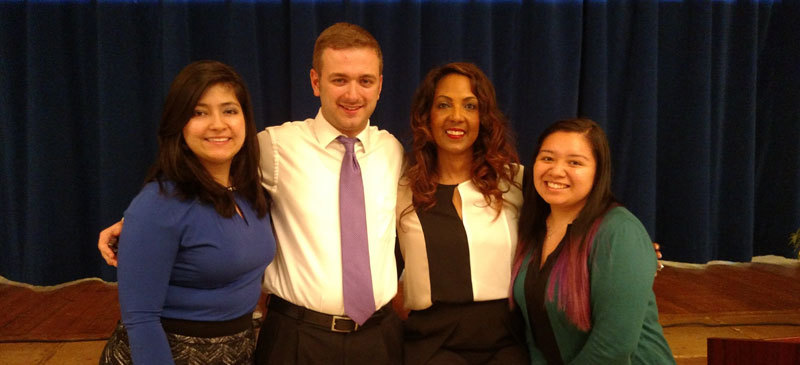She spoke as a mother, as an African-American woman and as the daughter of two immigrant parents from Jamaica. She also spoke as a “recovering” attorney and as a TV political analyst.
But it was as an American voter that Michelle Bernard spoke most passionately during her visits to St. Joseph’s College’s campuses on Long Island and Brooklyn, May 11 and 12.
“We were told that we shouldn’t ‘worry our pretty little heads about politics.’ Now, we care about education, politics, equality and issues, in general. All issues are women’s issues.”
“Women as single-issue voters is a thing of the past,” Bernard said during SJC’s 2016 Presidential Lecture, More Than Single-Issue Voters: How Today’s American Women Are Changing the Face of Feminism.
“We were told that we shouldn’t ‘worry our pretty little heads about politics.’ Now, we care about education, politics, equality and issues, in general. All issues are women’s issues,” Bernard told an audience of students, faculty and community members in The Muriel & Virginia Pless Center for Performing Arts at SJC Long Island on May 11.
Bernard spoke the following afternoon at SJC Brooklyn’s Tuohy Hall. In both lectures, Bernard talked about feminism, politics, current events, society, her experiences with racism and sexism, and her career as a political analyst on MSNBC, CNN and HBO.
After graduating with a J.D. from Georgetown University, Bernard began her career as a lawyer in 1988 and was immediately the victim of ignorance, she said. “People were surprised that I wasn’t there to bring them coffee or water and that I was actually a lawyer at the firm,” she said.
After decades of steady improvement, this way of thinking seems to have resurfaced in the form of a volatile political landscape reflecting anger, division and ignorance. Sexism, racism and classism have been brought front and center, and the candidates are vociferous in their beliefs for or against public policy and societal issues.
Bernard, however, remains optimistic. She said that women are much better off today than they were decades ago. According to Frontiers in Psychology, women and men currently progress from a bachelor’s to a Ph.D. in physical science, mathematics and engineering at the same rate.
“We can vote and the divorce laws no longer protect the rights of the man,” she said. “Today, women have better access to education. There are laws against domestic violence and we have the Violence Against Women Act.”
According to the White House, since the Violence Against Women Act (VAWA) was introduced in 1994, intimate partner violence decreased 67 percent and the rate of intimate partner homicides of women and men is down 35 percent and 46 percent respectively.
“As long as gender inequality is seen as a female issue, it will not receive support for policy change.”
Bernard mentioned the 2016 State of the Union Address, which she watched eagerly as President Obama spoke about pay equity and raising minimum wage for all Americans, giving the issue credibility as more than a “women’s issue.” She mentioned other matters that have been given more credence by including all Americans, such as sexual abuse in the military, which went all but ignored until men began testifying.
“As long as gender inequality is seen as a female issue, it will not receive support for policy change,” Bernard said.
In recent years, women have shined the light on other significant issues by being active on social media and creating hashtags of solidarity. Rape culture was called out on college campuses and social media with #RapeCultureisWhen. And, when more than 270 young girls were kidnapped from school in Nigeria by the terrorist group Boko Haram, women, including First Lady Michelle Obama, were vocal across social media with #BringBackOurGirls.
They remain active, counting the days since the kidnapping and bringing attention to the fact that 219 girls are still missing. The hashtag started a movement and assembled a large caring group of citizens who are pushing for government to search for and rescue the girls.
With #IamJada, men and women told stories about rape and stood with Jada, a 16-year-old who went to a party and didn’t remember what happened at the party until photos and hurtful comments were posted to social media. By taking control of the story, she empowered people to fight cyberbullying and sexual abuse.
Bernard thinks there is much to be done because progress is so often slow. She left the crowd with the motivation to “think globally” and “ask questions.”
“Today’s Americans do not have to reflect the hateful past of narrow minds,” she said.
When historians look back at 2016 in America, what will they learn and who will they talk about? Michelle Bernard hopes that historians will find us on the right side of history and that young minds move us in that direction.


